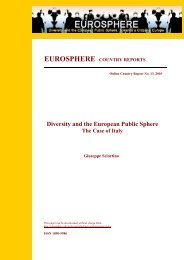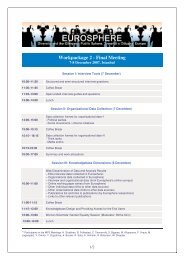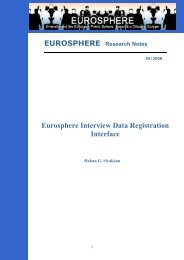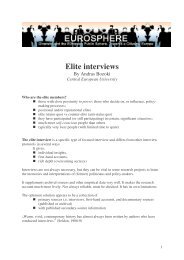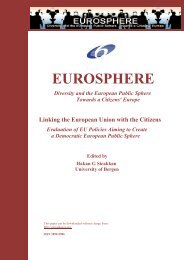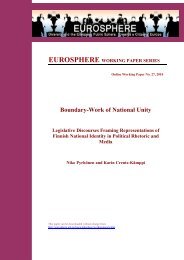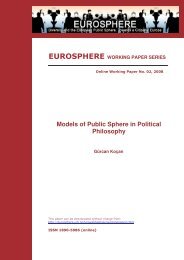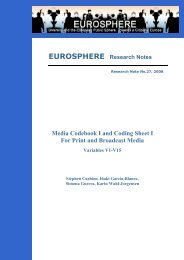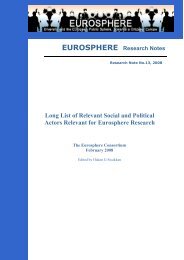Migrants, Minorities, Belongings and Citizenship. Glocalization and ...
Migrants, Minorities, Belongings and Citizenship. Glocalization and ...
Migrants, Minorities, Belongings and Citizenship. Glocalization and ...
You also want an ePaper? Increase the reach of your titles
YUMPU automatically turns print PDFs into web optimized ePapers that Google loves.
Fig. 14 illustrates the most important predictors of the second (mis)alignment dimension<br />
that we uncovered – (mis)alignment in national/essentialized versus glocal spaces. The<br />
situation also here is the same: changes in one predictor will lead to elimination of one<br />
misalignment <strong>and</strong> reification of another simultaneously. For example, increasing “mobility<br />
of mind between all references of identification” <strong>and</strong> decreasing “political belonging”<br />
simultaneously will increase alignment in glocal spaces, but this will also increase<br />
misalignments in national <strong>and</strong> essentialized spaces.<br />
To reduce/eliminate certain misalignments, one of the three models that were tested can<br />
be utilized. The belonging model requires changing the multidimensional belongings of<br />
citizens <strong>and</strong> residents. The mobility model requires changing the psychic <strong>and</strong> spatial<br />
mobility patterns of citizens <strong>and</strong> residents. However, pertaining to both belonging <strong>and</strong><br />
mobility models, such measures may raise ethical questions, as any choice will imply<br />
giving priority to certain “modes of being”. The participation model, on the other h<strong>and</strong>,<br />
requires strengthening <strong>and</strong>/or designing <strong>and</strong> establishment of the types of public spaces<br />
that residents <strong>and</strong> citizens need for voicing, articulating, <strong>and</strong> representing their<br />
preferences emanating from their belongings <strong>and</strong> other interests without having to<br />
change themselves.<br />
2. Advancing the state of the art<br />
The Glocalmig’s contribution to the existing state of the art in the field of citizenship<br />
studies is primarily its diversity perspective <strong>and</strong> its research tools, which extend the<br />
ontological <strong>and</strong> conceptual array of the thinking in the field. Secondarily, its contribution<br />
to the state of the art is the new knowledge produced by the use of these research tools.<br />
The presentation in this section addresses both aspects simultaneously.<br />
We would first like to mention the impact of the diversity perspective on our research. To<br />
what we stated in the beginning about the diversity perspective, we can add its<br />
normative orientation. The diversity perspective is not about designing policies, politics or<br />
political systems that can effectively manage diversity; but to discover the modes of<br />
being, the types of individuals, <strong>and</strong> the prototypes of the public spaces of diversity that<br />
can manage politics. In other words, it is about empowering diverse societies to manage<br />
politics. Therefore, all the research activities of the Glocalmig-project sought the types of<br />
individuals <strong>and</strong> public spaces who make diversity into a mode of being (cf. also the<br />
notion of co-other in the beginning). This is the reason why we focused on the “glocal<br />
spaces”, which we regard as the potential prototypes of future diverse societies that<br />
effectively manage politics. The “glocal public spaces” that we did fieldwork in<br />
accommodate various individuals <strong>and</strong> groups with highly diverse belongings. Our finding<br />
103



